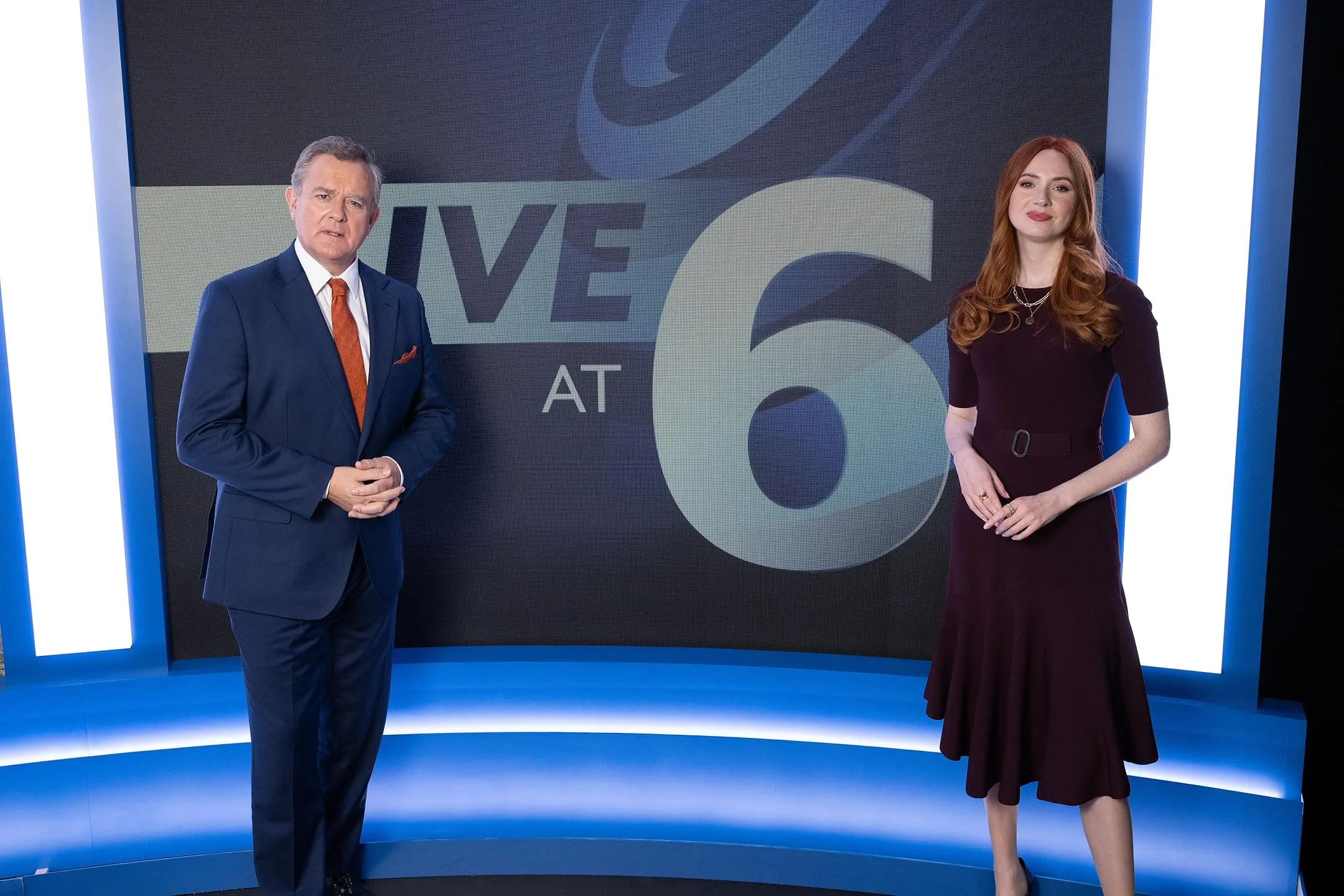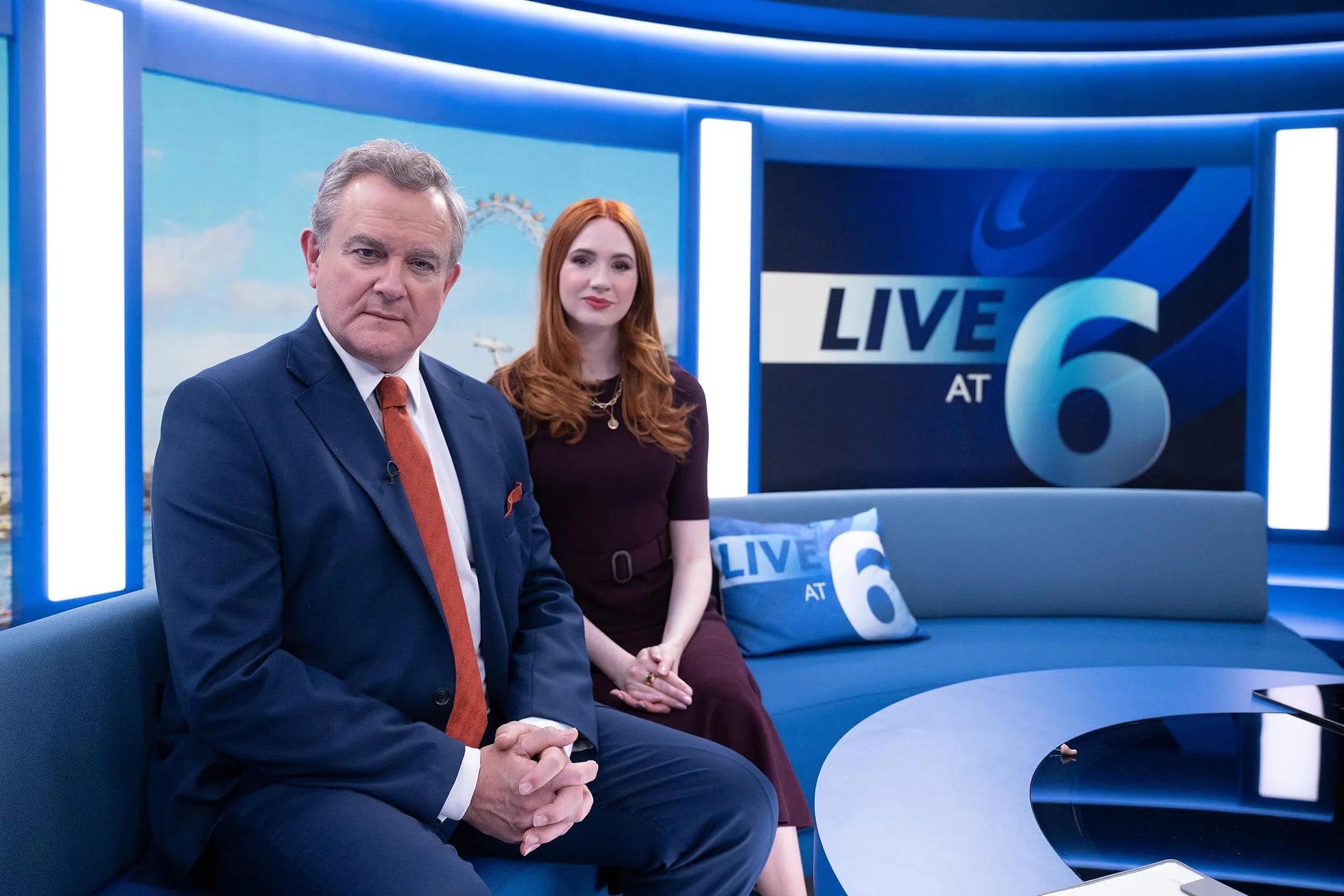Douglas Is Cancelled centers on Douglas Bellowes (Hugh Bonneville), a popular TV presenter whose career is thrown into turmoil after a sexist joke he allegedly made at a wedding goes viral.
The controversy begins when a social media post claims to have overheard the remark, and though the tweet initially seems insignificant, the snowball effect takes over. What seemed like a minor indiscretion quickly turns into an all-consuming scandal that Douglas and his team must contend with.
As the news spreads, the series explores how Douglas and those around him react to the growing storm. His wife Sheila (Alex Kingston), a tabloid editor, and co-presenter Madeline (Karen Gillan) each play crucial roles in managing the crisis.
The situation spirals further as media outlets, public opinion, and corporate interests amplify the drama, turning a fleeting mistake into a much larger conversation about cancel culture and its immediate impact.
Character Development: A Closer Look at Complex Personalities
In Douglas Is Cancelled, character development is crucial in portraying how individuals react to the turmoil of a public scandal. Douglas Bellowes (Hugh Bonneville), the central character, is initially seen as a sympathetic TV presenter.
His career unravels after a sexist joke he allegedly made at a wedding spreads across social media. As the scandal intensifies, Douglas’ inability to handle the situation reveals his deeper flaws. He struggles to defend himself, caught between being a victim of an accusation he can’t remember and confronting the unsettling reality that his own life is beyond his control.
Madeline Crow (Karen Gillan), the younger co-presenter, contrasts Douglas with her hidden ambitions and motivations. Initially offering support, her role evolves throughout the series as she becomes more involved in the crisis. Gillan’s portrayal adds layers to Madeline’s character, whose personal agenda becomes clearer as the series unfolds, leaving viewers questioning her true intentions.
Sheila Bellowes (Alex Kingston), Douglas’ wife and a tabloid editor, is an intriguing character, simultaneously protective and calculating. Sheila’s understanding of media manipulation helps shield her family, but her dual role as both protector and manipulator raises questions about loyalty and self-preservation. Kingston brings a sharp, pragmatic edge to Sheila, making her both a figure of empathy and suspicion.
Supporting characters, such as Claudia (Madeleine Power) and Toby (Ben Miles), provide further nuance. Claudia’s generational clash with her parents highlights a modern cultural divide, while Toby, a morally ambiguous producer, adds complexity to the workplace dynamics. Together, these characters deepen the series’ exploration of cancel culture, media scrutiny, and personal accountability.
Performance & Acting: Navigating Scandal with Precision
Hugh Bonneville’s portrayal of Douglas Bellowes is an exemplary study in portraying a character trapped in a whirlwind of public outrage. He deftly captures Douglas’ transition from the calm, confident TV presenter to a man on the verge of losing everything.
Bonneville’s performance walks the line between vulnerability and haplessness, showing Douglas’ inability to control a crisis that is spiraling out of his hands. The way Bonneville handles Douglas’ growing sense of dread without veering into melodrama speaks volumes about the subtle complexity of the character.
Karen Gillan, as Madeline, strikes a careful balance between being a compassionate co-presenter and a character with ulterior motives. Gillan’s portrayal is marked by restraint, allowing Madeline’s evolving ambition to unfold gradually.
The chemistry between her and Bonneville is electric, as their dynamic shifts from professional camaraderie to something much more intricate, filled with underlying tensions that Gillan navigates with finesse.
Alex Kingston’s Sheila is the rock in a sea of chaos, a media-savvy wife who understands the harsh realities of public life. Her portrayal offers a cynical yet practical approach to saving her family’s reputation. Kingston perfectly balances Sheila’s protective instincts with her strategic manipulation, making her a fascinating character to watch.
Ben Miles, as Toby, and Simon Russell Beale, as Bentley, also provide essential performances that heighten the tension within the newsroom and within the family dynamic, each adding layers of complexity to the unfolding drama.
Themes & Satirical Elements: Examining the Machinery of Modern Scandal
Douglas Is Cancelled navigates the complex issue of cancel culture, framing it within a media landscape that amplifies trivial events into life-altering consequences. The series zeroes in on a seemingly minor accusation—a sexist joke—escalating into a public spectacle.
This contrast between the smallness of the initial incident and its devastating impact reflects a broader anxiety about the consequences of public life in the digital era. What is especially striking is how the show leaves the specifics of the joke vague, highlighting how a single statement, taken out of context, can fuel a far-reaching firestorm.
A key aspect of the narrative is the role of media in distorting and magnifying reality. As the scandal progresses, it becomes clear that the media is both a catalyst and a magnifier, manipulating public opinion and turning personal moments into broader societal debates. The show critiques how easily public narratives shift and how quickly reputations can be torn apart, often without the full picture being understood.
Gender and power dynamics provide another layer of complexity. Sheila Bellowes, a seasoned tabloid editor, operates within a system that both exploits and is shaped by powerful women, offering a critique of how gender politics intersect with media manipulation.
Meanwhile, Madeline, Douglas’ co-presenter, evolves from a sympathetic figure to one driven by ambition, making her role in the scandal ever more significant. The interactions between these characters reflect the shifting power balances at play, making it harder to label anyone as simply a victim or a villain.
The generational divide, especially seen through characters like Claudia and Helen, brings an added satirical edge. These portrayals of Gen-Z perspectives provide a biting commentary on the digital activism and cultural shifts of the younger generation, amplifying their desire to “cancel” and their willingness to dismiss complexities in favor of simpler narratives.
Tone & Style: A Fine Balance of Humor and Drama
Douglas Is Cancelled blends drama with moments of sharp, satirical comedy. The humor isn’t just for laughs; it functions as a tool to highlight the absurdities within the media and cancel culture.
At times, the humor offers a breath of fresh air, only to be followed by a moment of tension that reminds the viewer of the high stakes. The comedy serves to critique societal norms, often giving way to darker themes without diminishing the seriousness of the issues at hand.
The contrast between the lighthearted banter and the heavier moments is what makes the show compelling, as it shifts seamlessly from one to the other, making the drama hit even harder when it does.
Moffat’s signature style is clear in the sharp dialogue and quick pacing. The rapid exchanges between characters keep the story moving while delivering insight into their motivations and relationships.
Moffat excels at layering his writing, creating a narrative that feels full of twists and turns, reminiscent of his work on Sherlock and Doctor Who.
Here, though, he shifts focus to a more intimate setting, where dialogue drives character development and plot progression. The style is consistent, compelling, and reflects Moffat’s strength in balancing tension and wit.
Pacing & Structure: Tight, Tense, and Unpredictable
The four-episode structure of Douglas Is Cancelled forces the show into a tight narrative focus, one that doesn’t waste a moment. With a shorter format, every scene feels purposeful, and the series effectively uses its limited runtime to heighten the stakes.
The brisk pacing benefits the plot, ensuring that the storyline moves swiftly and steadily toward its eventual crisis. Each episode is packed with enough tension and escalating drama to maintain engagement, making sure the show never drags, even in slower, character-driven moments.
Moffat’s handling of the episodes is strategic—he lets the narrative unfold piece by piece, skillfully withholding crucial details at just the right moments to keep viewers on edge. Rather than relying on a conventional or predictable structure, the show maintains an air of unpredictability, with each episode revealing something new that complicates the situation.
The pacing mirrors the rise and fall of public perception, which fluctuates rapidly, echoing the unpredictable nature of the media cycle. The tension builds gradually but consistently, without rushing toward its emotional peak too quickly, keeping the audience anticipating the next twist.
The Review
Douglas Is Cancelled Season 1
Douglas Is Cancelled presents a biting, fast-paced exploration of cancel culture, driven by sharp performances and a tightly wound narrative. Moffat’s blend of drama and satire keeps the stakes high, while his signature structure and dialogue create a tense atmosphere. While the show at times oversimplifies some of its more complex themes, it effectively taps into current cultural anxieties. With standout performances from Bonneville and Gillan, this is a timely, engaging watch, though it may leave some wanting a deeper exploration of its key themes.
PROS
- Sharp performances, particularly from Hugh Bonneville and Karen Gillan.
- A tense, fast-paced narrative that keeps viewers engaged.
- Insightful commentary on cancel culture and media manipulation.
CONS
- Some themes feel oversimplified or rushed.
- Occasional lack of nuance in the portrayal of generational conflicts.
- The satire might not resonate with all viewers.




















































